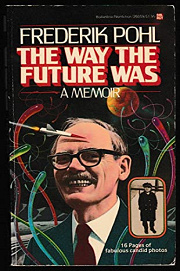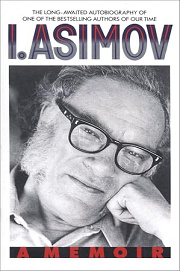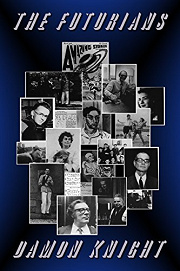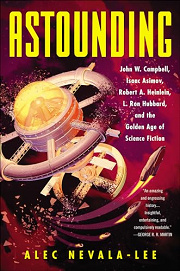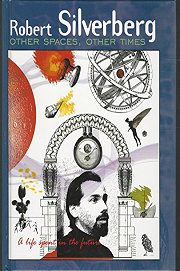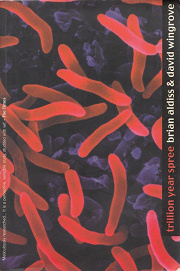Share your thoughts in a quick Shelf Talk!
The Way the Future Was by Frederik Pohl
From pulp magazines and smoky offices to award stages and beyond, a legendary writer charts the inside story of a genre’s golden ages. Candid, witty, and full of astonishing cameos, The Way the Future Was is a front-row seat to science fiction’s rise—told by someone who helped shape it.
Have you read this book? Share what you liked (or didn’t), and we’ll use your answers to recommend your next favorite read!
Love The Way the Future Was but not sure what to read next?
These picks are popular with readers who enjoyed this book. Complete a quick Shelf Talk to get recommendations made just for you! Warning: possible spoilers for The Way the Future Was below.
In The Way the Future Was, did you enjoy ...
... candid, first-person reminiscences about Campbell-era SF and shared colleagues?
I. Asimov: A Memoir by Isaac Asimov
If you loved the conversational, confiding tone of The Way the Future Was—Pohl walking you through lunches with John W. Campbell, the birth of projects like The Space Merchants with Cyril Kornbluth, and the day-to-day grind at magazines like Galaxy and If—you’ll relish Asimov’s own voice in I. Asimov. He recounts the genesis of the Foundation stories under Campbell, tussles with editors you met in Pohl’s pages, and his wry, self-deprecating takes on the same conventions and colleagues Pohl gossips about. It feels like a continuation of those backstage conversations, told from another seat at the same table.
... behind-the-scenes fandom and publishing feuds, from the 1939 Worldcon schism to editorial power plays?
The Futurians by Damon Knight
Pohl’s chapters on the New York fan cliques, his youthful politics, and the infamous feuds that shaped early SF are a perfect setup for The Futurians. Knight digs into the same battles Pohl mentions—the 1939 Worldcon dust-up, factional splits, and the tangled friendships that later shaped careers—featuring the very people Pohl keeps running into: Cyril Kornbluth, Judith Merril, and others. If the insider tussles behind Galaxy/If and Pohl’s party-line years fascinated you, this is the vivid, boots-on-the-ground chronicle of that scene.
... an interwoven portrait of Campbell, Asimov, Heinlein, and Hubbard that echoes the crowded stage of SF’s Golden Age?
Astounding: John W. Campbell, Isaac Asimov, Robert A. Heinlein, L. Ron Hubbard, and the Golden Age of Science Fiction by Alec Nevala-Lee
One joy of The Way the Future Was is how many giants stride through it—Campbell calling shots, Asimov dropping by, Heinlein debating, and Pohl navigating it all. Astounding zooms in on that ensemble and shows how their intersecting lives reshaped the field Pohl edited and wrote in. If Pohl’s stories about editorial sway, writerly rivalries, and the evolution from Astounding to Galaxy era grabbed you, Nevala-Lee’s tight, overlapping biographies will scratch the same itch—complete with fresh angles on the same personalities Pohl profiles.
... wry, insider anecdotes about editors, conventions, and deadline disasters?
Other Spaces, Other Times: A Life Spent in the Future by Robert Silverberg
Pohl’s memoir sparkles with dry asides—his ad-man origin for The Space Merchants, the Hugo-winning turnaround at If, and cheerful name-drops that double as punchlines. Silverberg’s Other Spaces, Other Times brings that same sly grin to the table: backstage tales about editorial wrangles, marathon writing jags, and convention escapades with many of the folks Pohl introduces. If Pohl’s humor and gentle razzing of friends like Kornbluth and Judy Merril made you smile, Silverberg’s raconteur flair will, too.
... big-picture history that contextualizes Pohl’s career, Galaxy-era satire, and the impact of Kornbluth collaborations?
Trillion Year Spree: The History of Science Fiction by Brian W. Aldiss and David Wingrove
If part of the pleasure in The Way the Future Was was connecting Pohl’s life—editing If to Hugo glory, teaming with Kornbluth on The Space Merchants, sparring with Campbell—to the larger arc of the genre, Trillion Year Spree delivers the panoramic view. Aldiss and Wingrove analyze the very currents Pohl swam in: the rise of sociological SF at Galaxy, the shift from Campbell’s dominance, and why books like The Space Merchants mattered. It turns Pohl’s anecdotes into a coherent, thought-provoking map.
Unlock your personalized book recommendations! Just take a quick Shelf Talk for The Way the Future Was by Frederik Pohl. It’s only a few questions and takes less than a minute.
